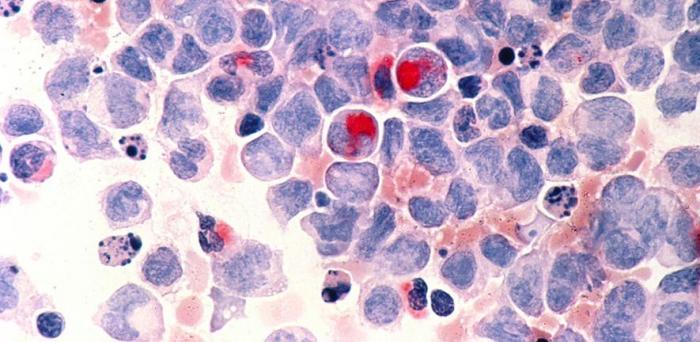Our genetic code is written in DNA, but in order to generate proteins – molecules that are vital to the function of living organisms – DNA first needs to be converted into RNA. The production of proteins is controlled by enzymes, which make chemical changes to RNA. Occasionally these enzymes become mis-regulated, being produced in over-abundance.
In a study published in 2017, a team led by Professor Tony Kouzarides from the Milner Therapeutics Institute and the Gurdon Institute at the University of Cambridge showed how one such enzyme, METTL3, plays a key role in the development and maintenance of acute myeloid leukaemia. The enzyme becomes over-expressed – that is, over-produced – in certain cell types, leading to the disease.
Acute myeloid leukaemia (AML) is a cancer of the blood in which bone marrow produces abnormal white blood cells known as myeloid cells, which normally protect the body against infection and against the spread of tissue damage. AML proceeds rapidly and aggressively, usually requiring immediate treatment, and affects both children and adults. Around 3,100 people are diagnosed with the condition every year in the UK, the majority of whom are over 65 years of age.
Now, Professor Kouzarides and colleagues at STORM Therapeutics, a Cambridge spinout associated with his team, and the Wellcome Sanger Institute, have identified a drug-like molecule, STM2457, that can inhibit the action of METTL3. In tissue cultured from individuals with AML and in mouse models of the disease, the team showed that the drug was able to block the cancerous effect caused by over-expression of the enzyme.
Professor Kouzarides said: “Proteins are essential for our bodies to function and are produced by a process that involves translating our DNA into RNA using enzymes. Sometimes, this process can go awry with potentially devastating consequences for human health. Until now, no one has targeted this essential process as a way of fighting cancer. This is the beginning of a new era for cancer therapeutics.”
Image: Human cells with acute myelocytic leukemia, shown with an esterase stain at 400x
Credit: National Cancer Institute
Reproduced courtesy of the University of Cambridge
